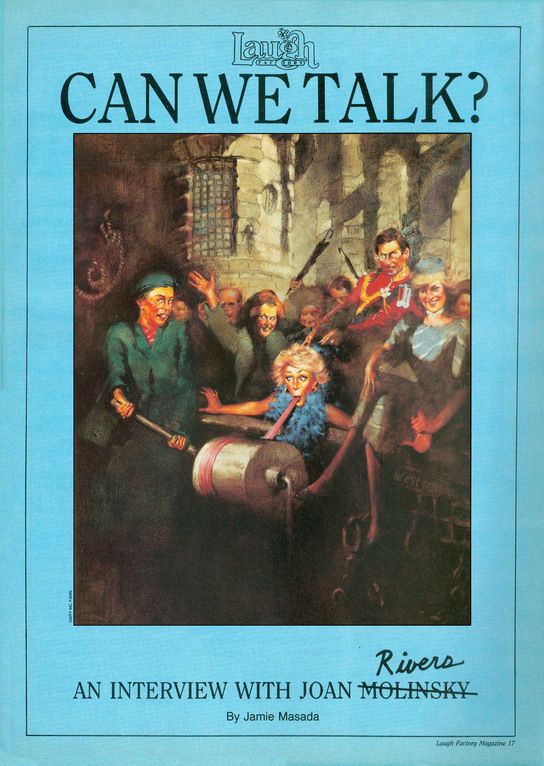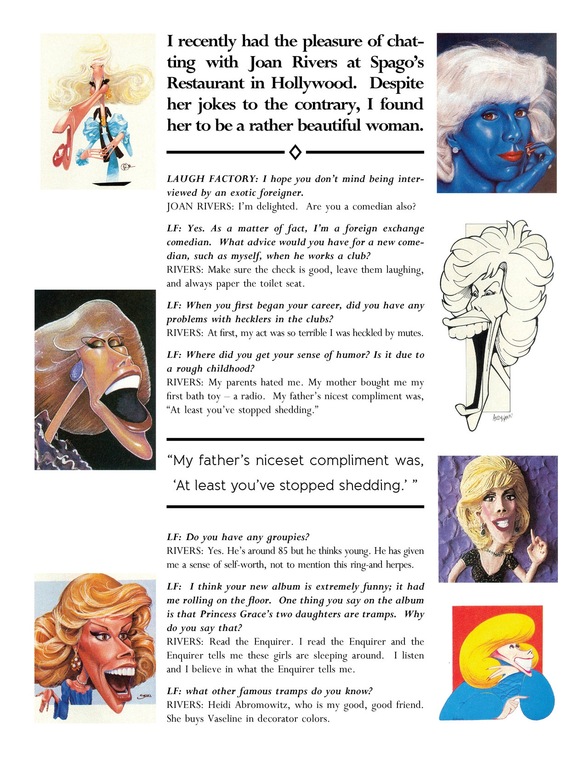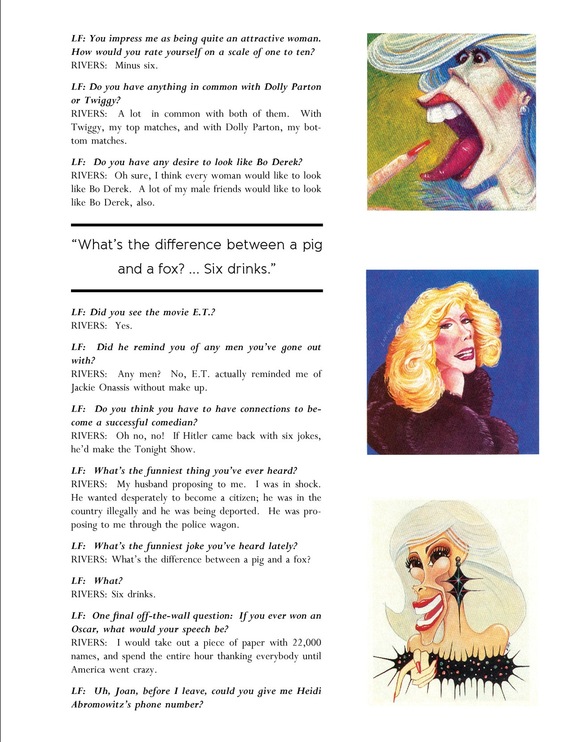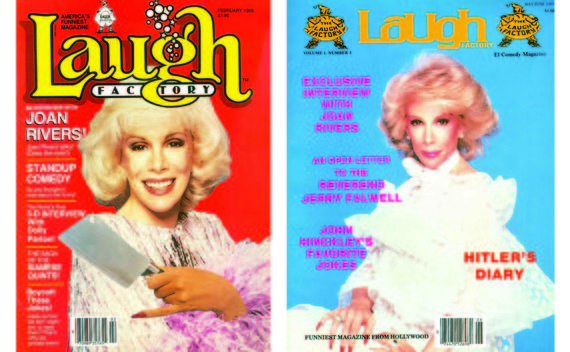When I was a teenager and new to America and comedy, I used to go wherever comics gathered. Back then, anyone could open a stage, because comics weren't paid. I tried to have some stage time at a showcase at the Hyatt Hotel on Sunset Boulevard and was accompanied by the great comic and my dear friend, George Miller. We were promised a spot, but as the evening wore on, a singer impersonating Jose Feliciano playing a flamenco guitar and another singer were brought on stage ahead of me The emcee got up and told some unfunny jokes and delayed further by bringing up another "foreigner," Yakov Smirnoff. George had had it and dragged me out front, where we saw Tom Dreesen in his car. Tom was on his way to meet us, but Miller said to him, "Take us to Ye Little Club in Beverly Hills," and off we went.
I'll never forget that night. We walked into the club, and Tom introduced me to Joan Rivers. She was larger than life and a woman comic to boot! I felt immediately the warmness and genuineness and kindness of her presence. Joan was standing next to comic Paul Mooney and Marshall Edson, the owner of the club. Tom Dreesen introduced me as a newcomer and asked if Joan could put me on, and Joan, without any hesitation, said, "He'll be on next." Right away I felt like she was giving me 100 percent of her attention.
Then I heard an explosive Paul Mooney yell, "Over my dead body! I'm next!" I thought we might be in for another Hyatt experience when I saw Marshall tap Paul on the back and smile, while Joan looked at me and winked. I think George wanted to avoid any confrontation and said, "You can't stand at the bar; you are underage," and took me outside. While I was wondering if I would ever get on stage, Joan popped out with a glass of Coca-Cola and reassured me that she would be bringing me on next. Then I could hear the applause for the comic leaving the stage and saw Joan turn and run into the showroom and onto the stage. George Miller and Tom Dreesen came to the doorway and said, "Hey, she's bringing you up!" and then I heard that high-pitched, raspy voice say, "If you like me, please give this next guy all of your love and attention. He's an exotic foreigner and a wonderful kid, and he's funny! Please welcome Jamie Masada!"
Now, Paul Mooney had a large afro at the time, and he was well-known because of his work as a Soul Train dancer. He started in: "Oh, no! She did not just do that!" Paul had a very distinctive voice. He kept going, saying somebody should call the police and "get this illegal alien out of here and send him back across the border where he belongs." Paul continued ranting, and I could hear Joan talking to him, trying to calm him down, saying, "Oh, Paul, please, he's a kid." Dreesen and Miller chimed in, saying, "Let him do his act." Mooney kept going; his voice got louder and louder: "I'm a big star on Soul Train, and I have more talent in one of my dancing moves than he ever could have." While he was demonstrating his dance moves and drinking, I made my way to the stage.
I opened with the line that Mitzi, who owned the Comedy Store, had said I should open with: "Hey, I'm from a very exotic desert city, Phoenix, Arizona. Does anybody want to buy some oil?" I then would say, "I have a lot in my hair." That was my opening line, and it was met with silence and strange stares from the audience. Paul Mooney let out a big fake laugh that drew attention to the fact that nobody was laughing. I continued to talk about how in America it's "confusing for foreigners" and recounted the time I was walking down the street and saw a sign that said "Animal Psychiatrist," and I thought to myself, "I would never go and lie down and tell my problems to a German Shepherd."
Well, there was some giggling, so I continued. I talked about how I wanted to find a girlfriend. I said that all the comics had given me the advice that if I wanted to go out with an American girl, I had to spend a lot of money on them. The first time I told that joke, I said, "I walked into a club, saw a girl, and said, 'Hello, I want to buy you a piano.'" David Letterman, watching me at the time, told me that I needed more of a punchline, so I added his suggestion. Now I ended it with the girl coming back at me and saying, "Nah, I'd rather have an organ."
Now I felt like I was on a roll, as I was getting more laughs. I told a few crazy jokes and then ended by saying that another comedian had told me that if I really wanted to meet American girls, I would have to go to dance clubs. He told me, "If you dance a slow dance with a girl, they get excited and go home with you." So I told the crowd that I went to a club and saw a girl who was extremely overweight and alone and asked her to dance with me. It was a slow song, and I think I was holding her too tightly, because she was struggling to breathe. After a while she whispered in my ear, "Can I ask you a question?" I said, "Sure." She said, "What do you use for protection in your country?" I told her, "A stick or a knife." She walked away from me.
People laughed and clapped, and I left the stage
On that note Joan came up, laughing really hard at that joke, and she kept saying, "That's funny! Knife or stick, stick or knife -- that's what you use for protection, really? Did you really use a stick? OK, very funny, young man. Very funny." She was laughing uncontrollably.
Paul Mooney, still irked that he didn't go on, came over and asked me, "Can I see your green card?" Tom, George, Marshall, and Joan laughed. Joan put her arm on my shoulder, giving me a kind, secure feeling that she was there and that I should not be afraid of anybody -- Mooney included. Joan told me, "Anytime you want to come by, I'm in here most of the time," and I could feel that she had a real warmness about her. Most people had come to see her, but she made me feel that I was the source of the merriment. "What a nice lady," I thought.
A few years later, in 1982, I was publishing a magazine for Warner Brothers, and Joan asked me if she could be on the cover, and I said I would be more than glad to put her on the cover.
The interview I did with her for the magazine is below:
As you can see, she was quick, funny, and simply terrific. She was fast on her feet. In 1985, when she was now a huge star, I asked her if she would be on the cover of the magazine again, and without hesitation she said yes.
As you can see, Joan was simply the best. I remember one time my friend, the actor Robert Harper, a member of the Academy, had two tickets for the Academy Awards, and we got good seats. That night I met so many celebrities, including Paul McCartney, but I particularly remember sitting next to an actress and her husband. I heard bits of their conversation and recall the actress saying, "I hope Joan Rivers saw me and made some comment about my dress." Her husband was saying, "Don't worry about that; we should watch the show," but she was so focused on whether she would be on Joan Rivers' show that the actual show before her eyes played second fiddle. I think the actress knew that the things Joan said about those on the red carpet came from a place of love. Her stingers were a form of tribute.
After I opened my own club, Joan invited me to see a comedian from Bangladesh named Gerry Bednob opening for her in Caesars Palace in Las Vegas. That's where I met Edgar, her husband. I remember that room in Caesars Palace sat over 1,000 people, and each night I was there, before the show started, I stood by the door and saw people coming into the showroom, some with walkers, some with canes, and some with sad faces because they had lost their money. Some of them had brought their families. Some were happy because they were seeing Joan, but most of the faces were unhappy.
By the time they were leaving, however, it was a different story. I was standing by the exit, and I saw these same people with canes and walkers were all walking out, laughing with smiles on their faces. Gerry was next to me, and I told him that Joan was truly a doctor of the soul. Here all her patients came to see her, over a thousand at a time, and after an hour and a half they walked out with smiles on their faces. This is something we should always remember about her: She made millions of people laugh. That is no small accomplishment.
And I really truly believe Joan paved the road for female comics. She did more than anybody for female comics. Comics like Rosanne Barr, Whoopi Goldberg, Ellen DeGeneres, Sarah Silverman, Amy Schumer, and so many others owe so much to Joan.
I remember one time she followed Richard Pryor on stage at the Laugh Factory. She had come to see a comedian perform, and the crowd wanted to see her, so we brought her up, and she went toe to toe with Richard Pryor, and she held her own. I would say she was one of the most important comedians of all time. In addition, she was a great mother. The last time I saw her, she was with her daughter and grandson Cooper at the Hollywood Laugh Factory. She told me that Cooper was going to be a great comic and to watch for him. Earlier, before the show, the TMZ bus stopped in front of the club, and she walked out and took her time to say hello to everybody on the bus. The people on the bus kept asking about her appearances on Howard Stern's show, and she took her time to answer everybody's question and spoke so highly of Howard.
She always tried to make everybody feel good. She was truly a doctor of the soul -- there are so few of them -- and as a comedian, she was one of a kind. And she is not just the most important female comic of all time but one of the most important and funniest comics of all time. Her name belongs right there with Lenny Bruce, Don Rickles, Richard Pryor, George Carlin, and Rodney Dangerfield. The history of comedy will remember her as one of the best of the best.
I can see it now: She is approaching God, asking, "Can we talk?" and making God laugh.




